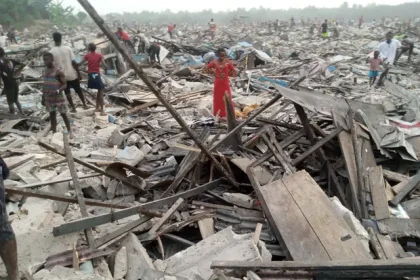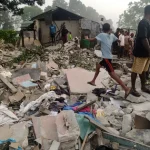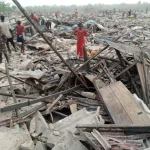Lawlessness without Conscience:
RIVERS State Government renders 15,000 Nigerians homeless, clears slum-only home to poor people
… Bulldozers rolled into Urualla, Port Harcourt recently, destroyed homes of hundreds of people, belongings scattered and lost, as government clearances of waterfront slums in the southern Nigerian city continues
*Over six days, the homes of thousands of families in eight slum communities in the Diobu area of the city shattered, with three neighborhoods earmarked to be cleared
*“We are refugees in our own state. Rain fell and all my belongings were drenched. You can imagine a woman who has not had her bath for a week because she has nowhere to do so. We woke up to the sight of bulldozers. We weren’t even allowed to salvage anything. Before we knew what was happening, we were rendered homeless. It was pathetic. The government says the move is to stop the illegal production and sale of diesel and paraffin”, lament Mary Prince, Diobu resident
*“The government is determined to sanitize the waterfronts by removing all shanties and most especially, continue with its frontal and hugely successful war to rid the state of criminals and undesirable elements who have transformed these waterfronts into a den of thieves”-Paulinus Nsirim, Commissioner for Information
*BY TIM IYETIMO/ENVIRONMENTAL Correspondent, Port Harcourt
RIVERS STATE government has come under intense criticism and backlash over the ways and manners the machinery of the state was used to make thousands of people homeless, driving these poor masses out of their shanty homes without allowing them to pick any of their properties.
More than 15,000 homes destroyed in Port Harcourt in a government plan to ‘sanitize the waterfronts by removing shanties’. The bulldozers rolled into Urualla, Port Harcourt, early on 30 January. By the end of the day, hundreds of people were homeless, their belongings scattered and lost, as government clearances of waterfront slums in the southern Nigerian city got under way.
Over six days, the homes of more than 15,000 families in eight slum communities in the Diobu area of the city were destroyed. Another three neighborhoods are earmarked to be cleared.
“We are refugees in our own state. Rain fell yesterday and all my belongings were drenched. You can imagine a woman who has not had her bath for a week because she has nowhere to do so,” said Diobu resident Mary Prince, wiping tears from her face with her headscarf.
“We woke up to the sight of bulldozers. We weren’t even allowed to salvage anything. Before we knew what was happening, we were rendered homeless. It was pathetic.”
The government says the move is to stop the illegal production and sale of diesel and paraffin.
The state commissioner for information, Paulinus Nsirim, said in a statement that the government is determined to “sanitize the waterfronts by removing all shanties and most especially, continue with its frontal and hugely successful war to rid the state of criminals and undesirable elements who have transformed these waterfronts into a den of thieves”.
Megan Chapman, co-director of Justice and Empowerment Initiatives (JEI), an advocacy group working in Port Harcourt, said the move “can only be seen as a land grab. There is no other explanation for it”.
“Presumed criminality doesn’t justify demolition. They should do their investigation and arrest the people responsible, charge them to court and prosecute them for the offenses committed,” she said.
Governor Nyesom Wike announced the evictions at the beginning of January, but residents said they were not consulted or offered compensation, as required by law.
Residents of Elechi waterfront community said they learned of their evictions when security forces came to the neighborhood on 19 January to mark the buildings for demolition.
“When we saw that happen, the secretary of the community confronted one of them. The man said we were given a seven-day notice,” said Barika Nwideezua, whose family has lived in Elechi for more than 60 years. “On the day the notice expired, we observed Black Wednesday.”
The military, police and Nigerian Security and Civil Defense Corps supervised the demolition.
“They didn’t allow us to take anything out of the place. One of my colleagues was beaten with the butt of a gun and his phone smashed,” said Nwideezua.
The next day, he said, he and other community leaders returned to the demolition site to help salvage belongings, but were arrested and taken to the police station. “Sixteen of us spent the night there. It was a terrible experience as I was beaten and maltreated by the inmates in the cell. I’ve lived here for over 30 years, yet was treated like an animal.”
According to the law, people should receive compensation or an alternative place to live if the state acquires their land. More than a month after the evictions, many people remain homeless, some living on the streets.
Amnesty International has called for an end to the demolitions and support for those already affected.
Chapman said her firm is helping those evicted fight for compensation and rehousing: “Unfortunately, I don’t see a lot of likelihood for justice. We’ve gotten judgments that ordered the government to resettle the people after they were forcefully evicted and those judgments have not been enforced.”
Prince now lives with her sister, about two hours from her former home.
“The stress is too much for me. As I speak with you, many people are now sleeping on the street. So, I guess I’m lucky.”
The police did not respond to requests for comment.
CERTAINLY, Good journalism costs a lot of money. Without doubt, only good journalism can ensure the possibility of a good society, an accountable democracy, and a transparent government. We are ready to hold every corrupt government accountable to the citizens. To continually enjoy free access to the best investigative journalism in Nigeria, we are requesting of you to consider making a modest support to this noble endeavor.”
By contributing to NAIJA STANDARD NEWSPAPER, you are helping to sustain a journalism of relevance and ensuring it remains free and available to all without fear or favor.
Your donation is voluntary — please decide how much and how often you want to give. For offline donation, email: letters@nigeriastandardnewspaper.com or call +2348037128048 (Nigeria) or +16825834890 (United States of America)
[pff-paystack id=





